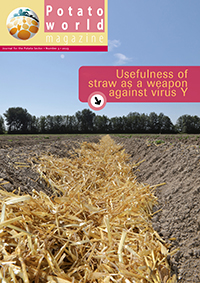Already a subscriber? Activate your premium account

Potatoworld Magazine

The terms breeding and specifically resistances are increasingly used in European policy documents as an important part of the route to sustainable potato cultivation with minimal emissions and use of crop protection products. Breeding must provide varieties that meet new emission and climate requirements and are also resistant to all kinds of pests and diseases.
The Netherlands is the leading potato breeding country in the world, so you might say this is all possible. That’s where my sensitivity starts, because I hear experts say that breeding for resistances cannot keep up with the loss of crop protection products. And the availability of faster and more precise breeding techniques has been discussed for a long time, but hardly any steps have been taken. Take Phytophthora infestans, for example. This disease is the biggest threat to potato cultivation. It affects leaves, stems and tubers of the potato plant. As a result, the crop can be completely lost within a few days. The spores occur in the soil, can survive there for several years and splash up to the crop during the growing season. But they can also spread through the air for many kilometers. You would say that climate change, long wet and dry periods, is ideal for these spores.
Around 1840, this disease was the cause of the huge famine, especially in Ireland. Time enough to eradicate this disease. The reverse almost seems to be the case. Recently – almost two hundred years later – in The Netherlands a Phytophthora Task Force has been established. In the same period, the FAO has called for a doubling of the world’s potato production within a decade in order to provide enough food for a growing world population. As the Netherlands, we – with our unique position in potato breeding and cultivation – have a heavy responsibility to support this. We can make great strides, but with the guiding principle of the availability of modern breeding techniques. So we can have a good crop yield, while limiting the risks, and not the guiding principle of reducing resources regardless of the consequences. I hope that policymakers will become more sensitive to this.
Dick Hylkema
Director of the Dutch Potato Organisation (NAO)
Events
©2015 - 2024 Potatoworld | Webdesign and realisation COMMPRO